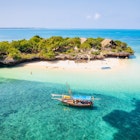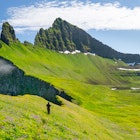

A view over Kampala from the top of the Old Kampala National Mosque's minaret © Bella Falk / Lonely Planet
Although visitors to Uganda come for the country’s rolling green landscapes and abundance of wildlife, logistics mean that everyone will likely have at least one night in the capital. But this is something to be celebrated rather than endured. Rated as the best city to live in East Africa, Kampala is a vibrant mix of the old and the new, with plenty of culture and history to delight the passing traveller. Here are some of the attractions Uganda’s capital has to offer.

Religion on a grand scale
A fantastic way to get your bearings in Kampala is to start your day with a visit to the Old Kampala National Mosque. This impressive, copper-domed building is one of the largest mosques in Africa and can accommodate about 12,000 worshippers. Inside, the main hall features delicate Egyptian chandeliers, Italian stained-glass windows, and a stunning red and blue carpet woven with images of the mosque itself. Climbing the 306 steps to the top of the minaret will reward you with a spectacular 360-degree view of the city – and if you’re feeling energetic you can even book a dawn visit and watch the sun rise over the city to the uplifting sounds of the call to prayer.
There are more stunning views of Kampala from Namirembe Cathedral, set on top of a hill west of the city centre. The vast red-brick building is over 100 years old and is surrounded by well-kept gardens. Also worth a look is the Baha’i House of Worship, home of the Baha’i faith in Africa. This pretty nine-sided temple is topped with a massive green dome, and sits in peaceful parkland, which provides a welcome respite from the bustle of the city below.

History on display
Until the end of the 19th century, Uganda was divided into five kingdoms. Kampala was the capital of the largest, Buganda, from which the country takes its name. Sadly not much remains from that time, but you can still visit the Kasubi Tombs, where four of the kings of Buganda, known as kabakas, are buried. The Unesco World Heritage site's grand thatched building that housed the tombs was sadly destroyed in a fire in 2010, but a careful reconstruction is under way, and taking a tour still offers the opportunity to glean fascinating insights about Bugandan culture and traditions.
If it’s Uganda’s more recent past you’re interested in, head to Mengo Palace, the residence of the Kabaka Mutesa II prior to him being driven out in 1966 by the forces of Milton Obote led by Idi Amin. The complex includes the palace itself, a pretty cream-coloured building that’s still an official government residence (closed to the public), as well as gardens dotted with relics from the Amin and Obote eras, when it was used as a military barracks. The most notable – and disturbing – of these is the underground torture chambers, where a concrete tunnel leads to dark cells in which political prisoners were incarcerated without food or ventilation and subjected to beatings and electric shocks. The graffiti on the walls makes for a chilling yet fascinating glimpse into the country’s turbulent past.

Shopping for souvenirs
After a morning of culture, you might want to spend some of the afternoon exploring some of the city’s many markets, galleries and shopping centres. For typical East African crafts, there are two main permanent markets: the African Craft Village behind the National Theatre, and the Exposure Africa market on Buganda Rd. Here you’ll find a wide selection of handicrafts including wood carvings, leather and jewellery, many of which are imported from Kenya, but you’ll find local items here too. Every Friday there’s also a craft market in Nsambiya along Ggaba Rd where you can buy directly from artisans – often for better prices.
If markets and haggling aren’t your thing, head to one of the three branches of Banana Boat. Here you’re guaranteed to find beautiful Ugandan items you’re unlikely to find anywhere else, and the company works directly with local artisans so you can be sure your purchase is also helping to support communities.
Kampala also has a vibrant art scene with several galleries often representing internationally-recognised artists. AKA Gallery on Bukoto St, Afriart, and Nommo Gallery are probably the most popular, but there are plenty of others, all offering stunning and colourful paintings, crafts and textiles that you’ll be delighted to take home.

The joys of inner city transport
As well as being famous for its vibrant atmosphere, Kampala is unfortunately known for something rather less appealing: traffic jams. These make getting around a challenge, but not impossible if you do it right. The most convenient way to travel is by taxi. ‘Special hires’, as they’re known, are readily available at taxi ranks, or ask your hotel or restaurant to call one. The ultra-convenient Uber has also now come to Kampala, though be warned, the GPS is a little iffy and drivers will sometimes cancel if they don’t fancy your destination. Try to time your journey outside of peak rush hour, or you may be forced to watch as your dinner reservation slips by without you.
For longer journeys you might prefer to copy the locals and get a matatu. These run-down white minivans ply the main routes in and out of the city centre – they’re cheap and frequent, but can often be confusing as the destinations are not always marked.
If you’re feeling brave the fastest way to get from A to B is by boda boda. These motorcycle taxis swarm everywhere like flies, weaving in and out of traffic and narrowly avoiding accidents at every turn – so while certainly not for the faint-hearted, there’s no denying they are cheap, quick, and offer a thrilling taste of real Kampala life. To reduce the risks always use a recommended driver, or download the SafeBoda app – like Uber for bodas – where the drivers have first aid training and even provide a helmet.
After dark
It’s a good idea not to exhaust yourself too much during the day, because it’s when the sun goes down that Kampala really comes into its own. Known as the party capital of East Africa, the city is so celebrated for its buzzing nightlife that revellers come from as far away as Kenya, Tanzania and Rwanda to dance the weekends away.
The main strip of bars and clubs is in the city centre along Acacia Ave. Here you’ll find popular favourites Bubbles O’Learys Irish pub and Big Mike’s bar and nightclub, which regularly showcases excellent local bands. And a little further up the road is Cayenne, a one-stop night out boasting a restaurant, poolside bar, and dance floor that keeps hopping until the sun comes up.
Outside the city centre, Kabalagala has a reputation for being a slightly more seedy area, but with so many bars and restaurants you’ll have no trouble finding one that suits you. Try the famous Deuces, Café Cheri, or new kid on the block The Big Kafunda, an open-air space with a restaurant and DJ.
If music and dancing’s not really your thing, Kampala also has a well-deserved foodie reputation, with dozens of restaurants dishing up excellent international cuisines. Try Divino, which serves some of the best steak you’ll ever taste, Bistro for excellent fish, chicken and salads, Miso Garden for sizzling Korean pork and spicy ramen in a candlelit outdoor setting, or Mediterraneo for some of the best pizza and pasta you’ll find outside of Europe.
The Kampala lesson
Uganda may be all about the landscapes and wildlife, but Kampala is where the energy is. To miss it would be to miss a different side to Uganda: the country’s beating heart.
Explore related stories

Wildlife & Nature
These 12 sustainable vacation destinations blend adventure with eco-conscious livingDec 19, 2024 • 6 min read

 National ParksAll you need to know about African elephants – and where to spot them in the wild
National ParksAll you need to know about African elephants – and where to spot them in the wildApr 25, 2024 • 6 min read


 Wildlife & NatureGabon aims to become Africa's off-the-beaten-path safari destination in 2023
Wildlife & NatureGabon aims to become Africa's off-the-beaten-path safari destination in 2023Mar 27, 2023 • 5 min read


 National ParksThe lions of Africa: expert advice on how to see them on your next safari
National ParksThe lions of Africa: expert advice on how to see them on your next safariSep 8, 2022 • 7 min read
 National ParksSafari animals: the story of rhinos and the best places to see them in 2022
National ParksSafari animals: the story of rhinos and the best places to see them in 2022Aug 16, 2022 • 6 min read








